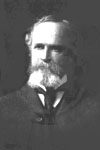Chapter 30. "Pragmatic Theory of Truth" by William James

William James, NIH
About the author…
William James (1842-1910) is perhaps the most widely known of the founders of pragmatism. Historically, his Principles of Psychology was the first unification of psychology as a philosophical science. As a teacher of philosophy, he was a colleague of both Josiah Royce and George Santayana. Once Royce was asked to substitute teach for James in James' Harvard philosophy class which, at the time, happened to be studying Royce's text. Supposedly, as Royce picked up James' copy of his text in the lecture hall, he hesitated briefly, and then noted to the class that James had written in the margin of the day's reading, " Damn fool!"
About the work…
In his Pragmatism,[1] William James characterizes truth in terms of usefulness and acceptance. In general, on his view, truth is found by attending to the practical consequences of ideas. To say that truth is mere agreement of ideas with matters of fact, according to James, is incomplete, and to say that truth is captured by coherence is not to distinguish it from a consistent falsity. In a genuine sense, James believes we construct truth in the process of successful living in the world: truth is in no sense absolute. Beliefs are considered to be true if and only if they are useful and can be practically applied. At one point in his works, James states, "…the ultimate test for us of what a truth means is the conduct it dictates or inspires." Certainly, one difficulty in understanding James lies in the interpretation of his rhetorical flourishes.
Ideas of Interest from Pragmatism
In James' view, what are three stages in the normal development of a theory? Can you think of examples of theory-development in accordance with this paradigm?
Explain James' critique of the correspondence theory of truth. Is his characterization of the correspondence theory an oversimplification?
How does James define a true idea? Does his characterization clearly distinguish a true idea from a false idea?
Explain James' thesis concerning the pragmatic theory of truth. What do the words "verification" and "validation" themselves pragmatically mean?
James writes that "our ideas 'agree' with reality." How does this description differ from the suggestion that true ideas correspond with facts?
Discuss whether or not there is any difference between the true and the useful for James. How is the verification process related to this interpretation of truth?
According to James, what are the main objections of rationalism to pragmatism? How does James answer these objections?
Compare the notions of the true, the right, and the good as described by James at the end of this reading selection.